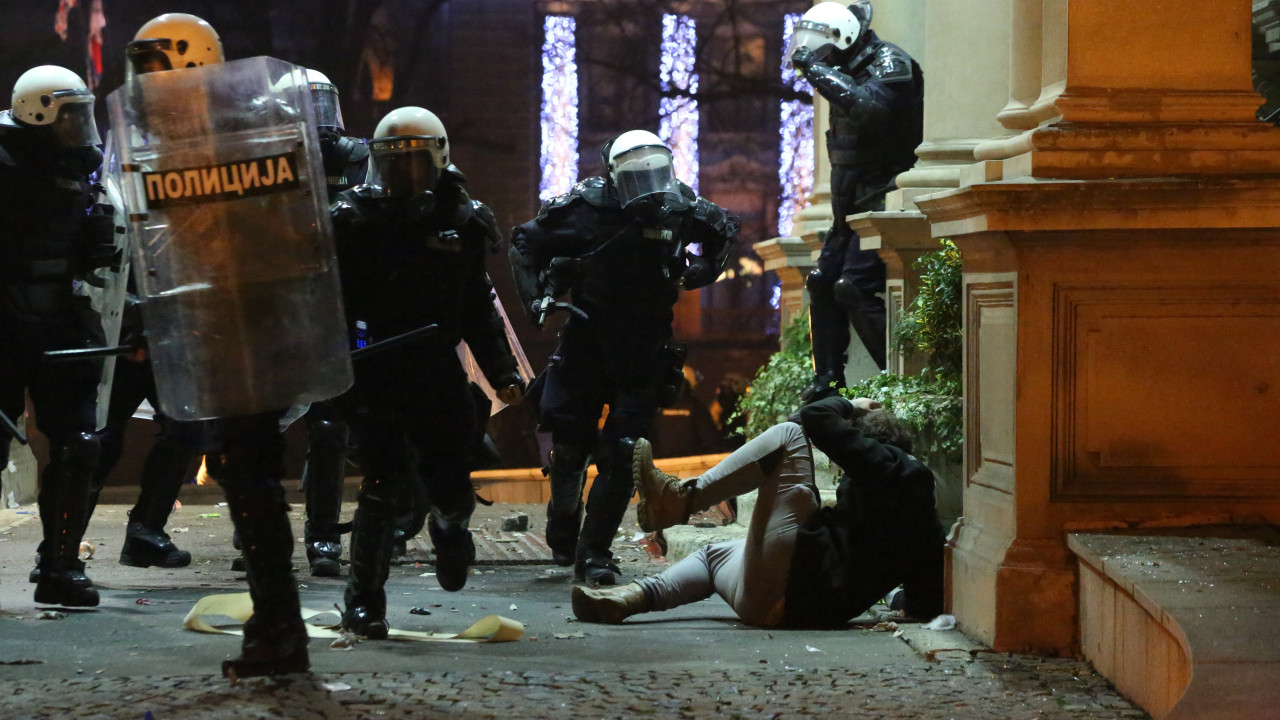
AAlthough international observer reports detected several irregularities, the Government denied the existence of electoral fraud. Today, President Aleksandar Vucic called these allegations “gross lies” promoted by the opposition.
“These scenes are dramatic (…) but there is no revolution underway and [os manifestantes] will not prevail”, the Serbian President later said in statements to the pro-government network Pink TV, before ensuring that the authorities “will have the capacity” to arrest and prosecute those responsible for the incidents.
In a statement, the Serbian Interior Ministry called on protesters not to resort to violence and assured that opposition representatives “provided guarantees that these events will not happen again.”
Police forces took cover inside the city hall building from where they fired tear gas at the protesters, who broke glass in the windows of the building’s facade, according to the Associated Press (AP) news agency.
Protesters shouted “Open the door” and “thieves”, while also throwing eggs towards the building, located in the center of Belgrade. Some chanted “Vucic is Putin”, comparing the Serbian President to the leader of Russia, according to the AP.
There were no immediate reports of injuries or arrests.
Last Thursday, the main opposition group in Serbia called on the European Union (EU) to collaborate in the international investigation into alleged irregularities in last Sunday’s legislative and municipal elections.
Allegations of electoral fraud are worsening political tension in the Balkan country, which has been involved in EU accession negotiations since 2012.
The Serbian opposition coalition against violence (SPN) indicated in a letter sent to EU institutions, officials and Member States that it does not recognize the result of last Sunday’s legislative and local elections and called on the EU to adopt the same position and initiate an investigation.
Serbia secured candidate status for membership already during Aleksandar Vucic’s mandate, but the opposition accuses the community bloc of ignoring the regime’s authoritarianism in exchange for stability in the Balkan region, still in turmoil following the wars in the 1990s. .
“The European Union now has a huge possibility of restoring the confidence of the population of Serbia”, said Dragan Djilas, one of the leaders of the SPN coalition, in statements to the AP news agency.
Djilas said the irregularities include media manipulation, false signatures on electoral lists, “buying” votes and voters from other countries, including citizens from neighboring Bosnia-Herzegovina. Opposition leaders claim that 40,000 people were taken to Serbia on voting day.
Officials from the European Commission expressed “concern” at the beginning of last week about an electoral process that “requires substantial improvement” and called for an analysis of “credible reports on irregularities”.
In the letter, the SPN calls on the EU to “not recognize the results of the legislative, municipal and in particular local elections in Serbia, until a broad international investigation into electoral irregularities has been completed.”
The letter adds that the EU should initiate the investigation and subsequently contribute to the formation of a verification committee to oversee the next elections to ensure free and fair voting.
Last Wednesday, the Serbian electoral commission announced the carrying out of new ballots in 30 polling stations where the results could not be released, three days after the elections contested by the opposition. These elections will mainly be organized in rural areas.
The announcement came after two days of demonstrations that brought together thousands of people in front of the electoral commission in Belgrade to contest the results of the elections, which gave victory to the presidential party (SNS, Vucic’s nationalist right) with 46.7% of the votes.
The SPN coalition secured 23.5% of the votes and has been denouncing several frauds since Sunday.
In a first reaction, SNS officials considered the elections free and fair despite criticism from the opposition and comments from international observers.
The allegations were confirmed by a preliminary report by the international observer mission (OSCE, European Parliament and Council of Europe), which referred to “vote buying” and “blocking of ballot boxes” at some polling stations.
According to the opposition coalition, “more than 40,000 people” voted in the capital — where municipal elections also took place — without being residents, and transported by bus from Republika Srpska (RS), the Serbian entity of neighboring Bosnia-Herzegovina.
Bosnian Serbs have the right to participate in national elections, but cannot vote in local elections.
Watch the video in the gallery above.
Read Also: Elections in Serbia will be repeated in 30 polling stations
All News. By the Minute.
Seventh consecutive year Consumer Choice for Online Press.
Download our free App.
Source: https://www.noticiasaominuto.com/mundo/2467899/policia-servia-intervem-em-protesto-contra-resultado-das-eleicoes-gerais


